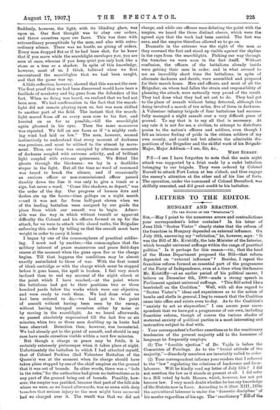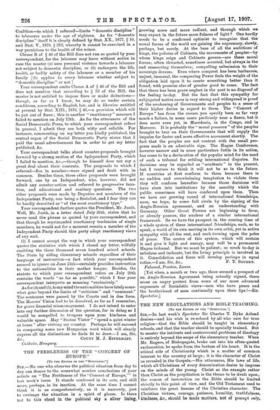LETTERS TO THE EDITOR.
HUNGARY AND REACTION.
re.° THII EDITOR or T1111 "Srservroa."1 SIR,—May I point to the numerous errors and contradictions your correspondent's letter contains P In his letter of June 15th " Scotus Viator " clearly states that the reform of the franchise in Hungary depended on external influence. On July 20th, answering my " refutation," he, however, says : " It was the Bill of Mr. Kristoffy, the late Minister of the Interior, which brought universal suffrage within the range of practical politics." Is it perhaps for this reason—viz., that the head of the Home Department proposed the Bill—that reform depended on "external influence" P Besides, I repeat the franchise reform formed an essential part of the programme of the Party of Independence, even at a time when the famous Mr. Krist6ffy—at an earlier period of his political 'career, I believe on December 6th, 1900—made a strong speech in Parliament against universal suffrage. " This Bill acted like a bombshell on the Coalition." Well, with all due regard to " Scotus Viator's " ideas and experiences as to the action of bombs and shells in general, I beg to remark that the Coalition came into office and exists even to-day. As to the Coalition's " anxiety to act as stepmother," I can assure your corre- spondent that we have got a programme of our own, including franchise reform, though of course the various shades of maternal anxiety of political parties is a moat interesting and instructive subject to deal with.
• Your correspondent's further assertions as to the reactionary tendencies of the present majority add to the looseness of language he frequently employs.
(1) The " forcible ejection " of Dr. Vajda is before the Committee of Privilege. As to the "brutal attitude of the majority,"—disorderly members are invariably called to order.
(2) Your correspondent informs your readers that I referred to the " law " regulating the relations of landowner and farm- labourer. Will he kindly read my letter of July 13th ? I did not mention the law as it stands at present at all. I did refer to a Bill voted by both Houses, which, however, has not yet become law. I very much doubt whether be has any knowledge of the Statute now iu force. According to it (Stat. XIII., 1876) the agricultural labourer is under the " domestic discipline " of his master regardless of his age. The " reactionary " Bill of the
Coalition—to which I referred—limits "domestic discipline" to labourers under the age of eighteen. As for "domestic discipline" itself it is clearly defined by Stat. XX., 1877, § 10, and Stat. V., 1878, § 313, whereby it cannot be exercised in a way pernicious to the health of the minor.
Clause B of § 46 of the Bill does not run as quoted by your correspondent, for the labourer may leave without notice in case the master (a) uses personal violence towards a labourer not subject to domestic discipline, or (b) endangers the life, health, or bodily safety of the labourer or a member of his family [(b) applies to every labourer whether subject to "domestic discipline" or not.]
Your correspondent omits Clause A of § 46 of the Bill and does not mention that according to § 33 of the Bill, the master is not entitled to impose fines or make deductions— though, as far as I know, he may do so under certain conditions, according to English law, and is likewise entitled at present by Stat. XIII., 1876, § 46,—a provision which will be put out of force ; this is another " reactionary " measure I failed to mention on July 13th. As for the utterances of the Social Democratic Press, to which your correspondent refers in general, I admit they are both witty and reliable. For instance, commenting on my letter you kindly published, the central organ of the Social Democratic Party states that I paid the usual advertisement fee in order to get my letter published, &c. .
Your correspondent talks about counter-proposals brought forward by a strong section of the Independent Party, which I failed to mention, &c.,—though he himself does not say a great deal about their contents. The proposals to which I referred—five in number—were signed and dealt with in common. Besides these, three other proposals were brought forward, one by an Independent, who, however, did not admit any counter-action and referred to progressive taxa- tion, and educational and sanitary questions. The two other proposals were made by Deputies not members of the Independent Party, one being a Socialist, and I fear they can be hardly described as "of the most reactionary type."
Your correspondent further quotes the President, Mr. Justh. Well, Mr. Justh, in a letter dated July 26th, states that he never used the phrase as quoted by your correspondent, and that though he reprimanded reactionary tendencies of single members, he would not for a moment remain a member of the Independent Party should this party adopt reactionary views of any sort.
(3) I cannot accept the way in which your correspondent quotes the statistics with which I closed my letter, wilfully omitting the three thousand seven hundred mixed schools. The State by aiding elementary schools regardless of their language of instruction—a fact which your correspondent seemed to ignore on June 15th—certainly provides instruction to the nationalities in their mother tongue. Besides, the statute to which your correspondent refers on July 20th contains the words " as far as possible," which I fear your correspondent interprets as meaning "exclusively."
As for (4) and (5), to my mind the nationalities have lately some- what gone beyond the limits of "criticism" and "comment." The sentences were passed by the Courts and in due form. The Masons' Union had to be dissolved, as far as I remember, for grave financial mismanagement. I do not intend to enter into any further discussion of the question, for in doing so I would be compelled to trespass upon your kindness and valuable space. May "Scotus Viator " "spend a quiet winter at home " after visiting my country. Perhaps he will succeed in composing some new Hungarian word which will clearly express all the distinctions he finds fit to draw.—I am, Sir,



































 Previous page
Previous page